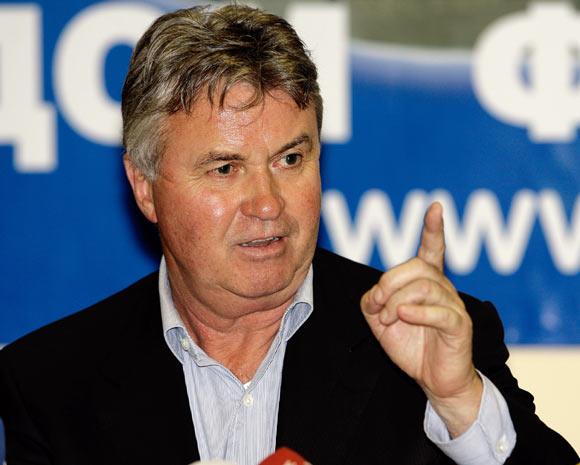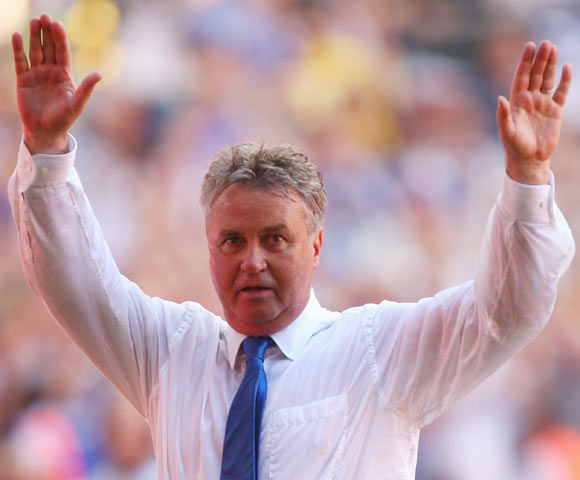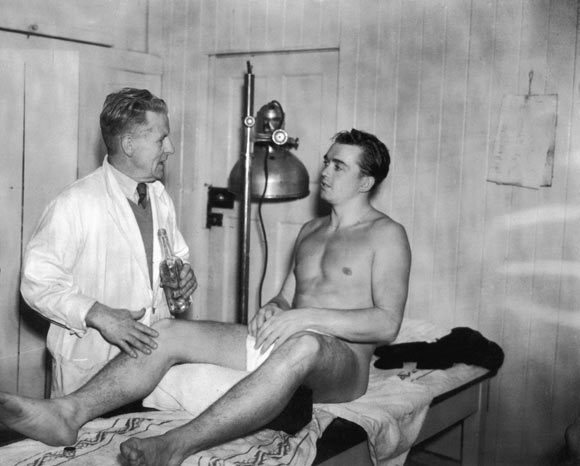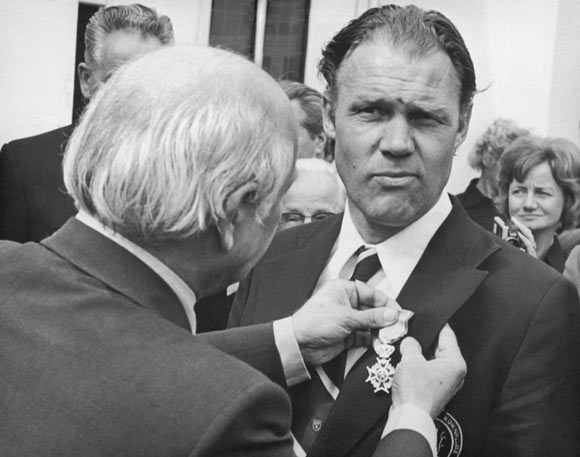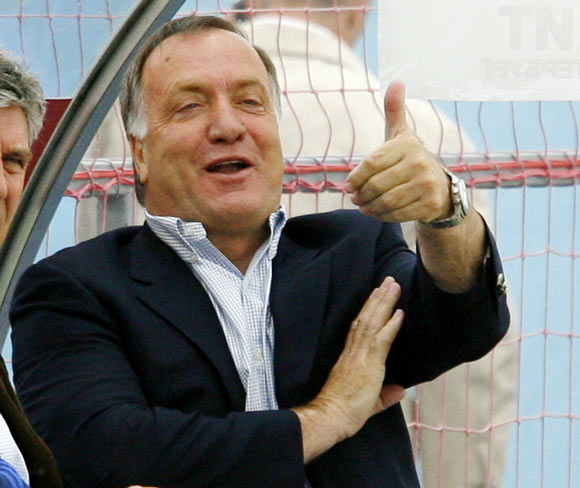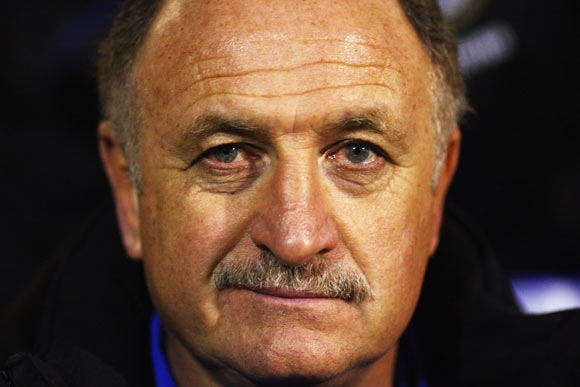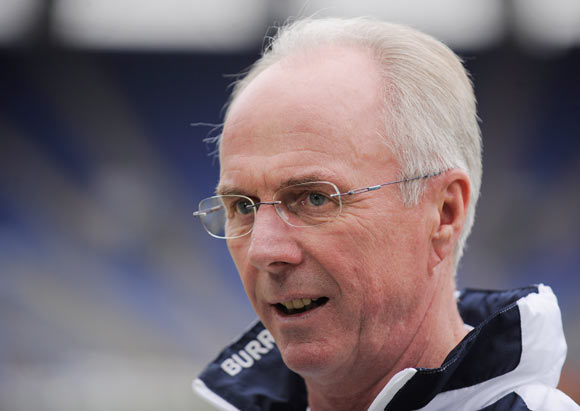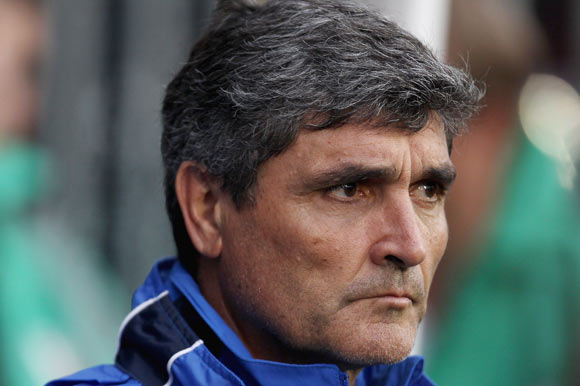 | « Back to article | Print this article |
At 65, Guus Hiddink starts afresh with Anzhi
As Guus Hiddink takes up a new assignment with Russian side Anzhi Makhachkala, Bikash Mohapatra takes a look at celebrated coaches who preceded the Dutchman in taking charge of relatively new clubs in the twilight of their careers.
While Arsene Wenger and Andre-Villa Boas were the subject of discussion over the last few weeks because of the shoddy performance of their respective clubs, Arsenal and Chelsea, Guus Hiddink took up a new assignment without much fuss.
The Dutchman's credentials as a coach need no introduction. Success at the club level with PSV Eindhoven, Real Madrid and Chelsea was superseded by his achievements as manager of various national teams.
While he took The Netherlands to the semi-finals of the 1998 World Cup, a similar effort with an unheralded South Korea team four years later surprised, rather shocked, one and all.
The 2006 World Cup saw him guide Australia to their best ever performance, while at Euro 2008, Russia, under him, made it to the semi-finals.
Hiddink was out of work since leaving Turkey, the team having lost to Croatia in a Euro 2012 qualification play-off last year. The 65-year-old had been strongly linked with a move back to Stamford Bridge, considering Villa-Boas failures.
Therefore, it came in as a surprise when the announcement of his new assignment was made with high on money (but low on history) Russian side Anzhi Makhachkala. After all, it was rumoured that Fabio Capello quit his job as England manager to move to eastwards.
Place in Europe is Hiddink's first goal
Anzhi, founded in 1991, is based in Russia's Dagestan republic, which borders Georgia and Azerbaijan, and is bankrolled by billionaire Suleyman Kerimov. The players live and train in Moscow due to security problems in Makhachkala, to where they fly in to play their home games.
Kerimov's arrival in January 2011 helped change the fortunes of the hitherto unknown club. Anzhi has since signed well-known names like Roberto Carlos, Samuel Eto'o, Yuri Zhirkov and Balasz Dzudszak.
At the winter break in the Russian Premier League, Anzhi find themselves in the seventh place and very much in the race for a place in Europe next season, something that would ensure them instant recognition.
That, certainly, is Hiddink's first target when the Russian domestic season resumes on March 5. His first league fixture is against Dynamo Moscow.
As the Dutchman settles down in the freezing climes of Eastern Europe, rediff.com takes a look at some noted coaches who preceded the Dutchman in taking charge of relatively new clubs in the twilight of their respective careers.
Swarovski Tirol's fortunes began and ended with Happel
Let's begin with a success story.
Ernst Happel will always be remembered as one of the most successful managers of all-time. The Austrian is one of three managers (in fact, the first) to win the European Cup with two different clubs -- Feyenoord Rotterdam (1970) and SV Hamburg (1983). He also coached the Netherlands' national team that lost the 1978 World Cup final to hosts Argentina.
Besides, Happel's impressive resume includes league and cup titles in as many as four countries -- the Netherlands, Belgium,Germany and Austria, the last of those being the biggest surprise.
Happel returned to his native Austria in 1987 and took charge as coach of FC Swarovski Tirol, a club formed as the result of a split long back. To his credit, he led the fledgling club to back-to-back Austrian championships in 1989 and 1990, besides winning the cup title in the earlier year.
Soon after Happel left to take charge of the Austrian national team, the club was dissolved.
Disappointing American sojourn for Michels
Arguably the best coach ever, Rinus Michels was named by FIFA as 'coach of the century'. The man is widely acknowledged as an exponent of 'total football'.
The Dutchman, nicknamed the General, had a long and illustrious career that yielded him a Euro title, a World Cup silver medal, a European Cup and league and cup titles in both the Netherlands (with Ajax) and Spain (with FC Barcelona).
It was, therefore, surprising when Michels decided to coach in the ill-fated North American Soccer League. League football in the United States was in a nascent state when the Dutchman took charge of the Los Angeles Aztecs in 1979?.
Michels quickly signed Dutch superstar Johan Cruyff, a move that boosted the attendance during the games considerably. However, even though Cruyff went on to win the NASL Most Valuable Player award in his only year with the Aztecs, for his mentor, the season was anything but memorable.
Even as he quit after just a year in charge, Michels was left astonished by what he had to endure in America.
'The job is the same all over the world, but those dancing girls? Do they really need those? I'm sorry. For me the game is too serious for all this,' the Dutchman was quoted as saying in the media as regards his American sojourn.
Advocaat gave Zenit the cutting edge
Arguably, the biggest success story among all the names in this list.
Dick Advocaat's professional career thus far can be bifurcated into two halves. First, as a relatively successful one at the club level -- he won league titles in three different countries.
The second was not so successful for the countries he was involved with. His stints with the national teams of the Netherlands, Saudi Arabia and South Korea offer nothing much to write about.
Having won multiple trophies with PSV Eindhoven and Glasgow Rangers among others, it was a surprise, therefore, when Advocaat took over the reigns at the then relatively unknown Zenit St Petersburg.
The Russian club had been bankrolled by gas giant Gazprom in December 2005 and the new owners handed the responsibility of ensuring quick results to the man nicknamed 'The Little General,' after his mentor (Rinus Michels).
Zenit finished in fourth place in Advocaat's maiden season in charge (2006). However, it was followed by unprecedented success in the next few seasons. The Dutchman led the club to the league title in 2007, the UEFA Cup the following year and the UEFA Super Cup -- at the expense of Manchester United -- thereafter, thereby putting them firmly on the footballing map.
Besides, he was also responsible for making stars out of the likes of Andrei Arshavin, Pavel Pogrebnyak and Alejandro Dominguez.
In the subsequent seasons, though, Zenit couldn't match up to the expectations and Advocaat was sacked in August 2010.
Small gains for 'Big Phil' in Uzbekistan
Luiz Felipe Scolari, the man Hiddink replaced at Stamford Bridge, was the last big name to do what the Dutchman has done now.
After his exit from Chelsea, the Brazilian, rather than scouting for another big club, took up a lucrative offer in far away Uzbekistan, with a club named Bunyodkar.
The move came in as a surprise for many, considering the pedigree of the coach -- a World Cup winner, Euro finalist and Copa Libertadores champion -- didn't match with that of the club.
However, Felipao, as Scolari is known, was aware of what he was doing. Early in his career, 'Big Phil' had taken over similar assignments, having had a successful two-year stint with Kuwaiti club Al Qadisiya and a not so successful one with J-League side Jubilo Iwata.
The Bunyodkor project, apart from the monetary part, seemed an audacious attempt to start with. The club had splurged vast amounts on a new stadium, training facilities and the acquisition of players -- including former World Cup winner Rivaldo -- and had even entered into a partnership with FC Barcelona.
Its goals were clearly outlined. To win the Asian Champions League and secure the chance to play in the World Club Cup, thereby ensuring it is noticed among the footballing elite.
Scolari was rumoured to have been offered 13 million euros a year for an 18 month deal, making him the highest paid manager in the world. The Brazilian palpably focused on the challenge part (vis-a-vis the monetary aspect) in most of his subsequent interviews.
Winning the league wasn't a problem for Bunyodkar, considering they had just one real rival to contend with (Pakhtakor). However, Scolari failed to help the club transfer their domestic dominance into the AFC Champions League.
The Uzbek side was ousted in the quarter-finals in his first year in charge and shown the door in the second round in the subsequent season, costing the coach his job.
Scolari has since returned to his native Brazil and is presently the manager of Palmeiras.
Eriksson's bravado yields zilch
Arguably one of the best coaches in the history of the game, Sven-Goran Eriksson has a whopping 17 major trophies to showcase for his efforts.
The fact that he has been successful with a bevy of clubs in his native Sweden, Portugal and Italy is not only testimony to the fact he was a good traveler, but also proves his mettle as a manager. Not to forget his successful handling of the national teams of England, Mexico and Cote d'Ivoire.
It is, therefore, shocking to find inconsequential names like Notts County and Leicester City in his resume.
Soon after leaving the England job in July 2007, the Swede took charge at cash rich Manchester City. Despite a good start -- he was named the Premier League's Manager of the Month for August -- and scoring home and away wins over local rivals Man United, Eriksson couldn't survive the sack.
The Swede's return to England in 2009 surprised all. Not for the return per se, but for the fact that he had taken charge of the League Two side (Notts County). To his credit, Eriksson managed to get players like Sol Campbell and Kasper Schmeichel to Nottingham.
However, he couldn't save the project from going kaput. His admission as to how he was duped has been well-documented thereafter. If that wasn't enough, the Swede took charge of Championship side Leicester City in October 2010.
However, his association with the Foxes lasted under a year, the club having failed in their objective for the season.
Spaniard attempts to break Ukrainian duopoly
For those wondering what is Juande Ramos up to these days, here's the answer.
The 57-year-old, who led FC Sevilla to successive UEFA Cup triumphs in 2006-07 and Tottenham Hotspur to the League Cup win in 2008, is now in charge of a lesser known Ukrainian club Dnipro Dnipropetrovsk. The move follows unsuccessful stints at Spurs, Real Madrid and CSKA Moscow.
In each of his first two seasons with Dnipro, the club finished fourth in the Ukrainian Premier League. However, it is yet to emerge as a serious contender to challenge the duopoly of Shakhtar Donetsk and Dynamo Kiev.
Ramos has often likened the situation in Ukraine to that in his native Spain.
'We're in the same situation as in Spain with Barcelona and Real Madrid at the top, but with Dynamo Kiev and Shakhtar Donetsk in Ukraine. And then there is a group of us teams who are behind them but trying to get as close to them as possible. We could say that FC Dnipro Dnepropetrovsk in Ukraine is like Valencia or Atletico Madrid,' he was quoted as saying in the local press.
However, deep down, the Spaniard knows, in his remaining two years in Ukraine, he has to try and break the hegemony of the top two, if he stays for the period that is!
